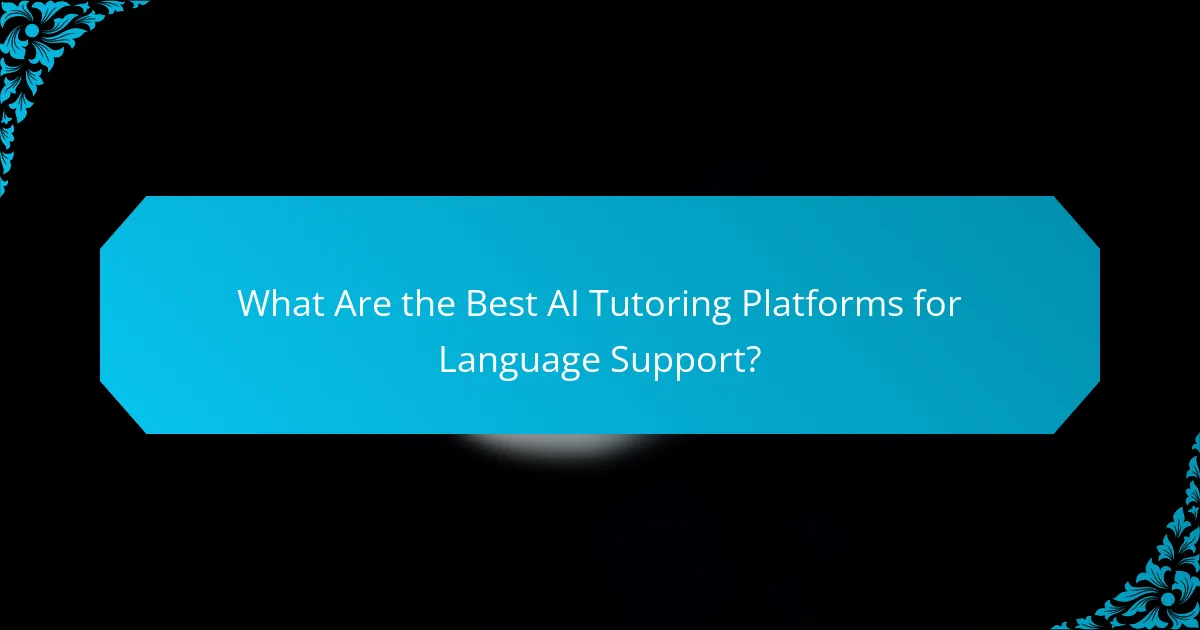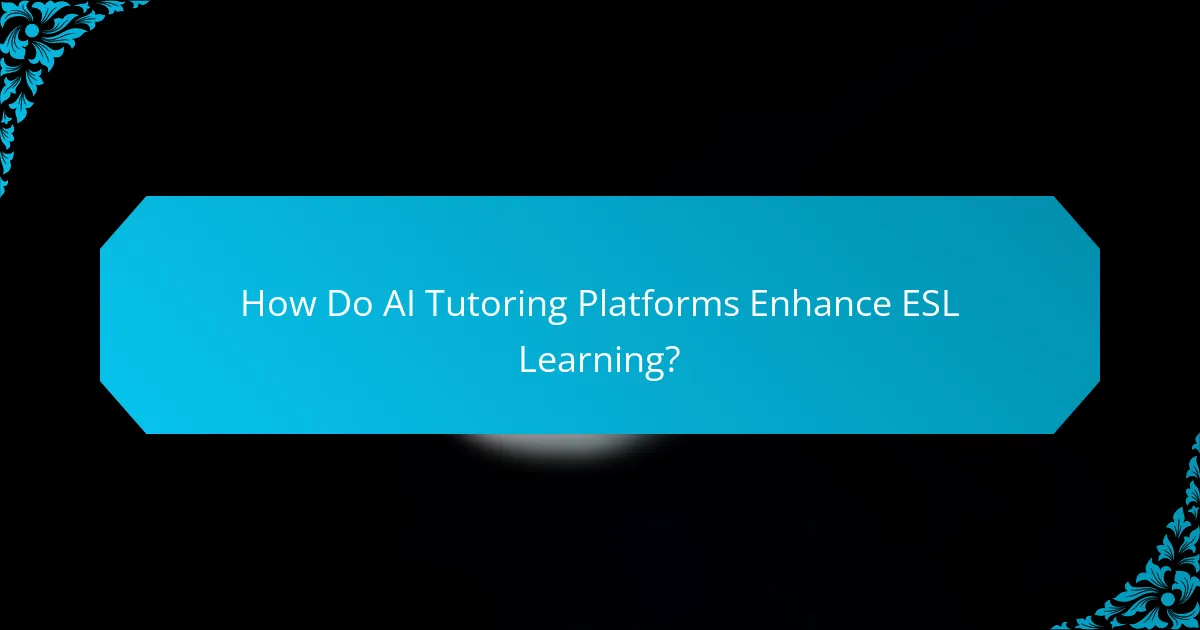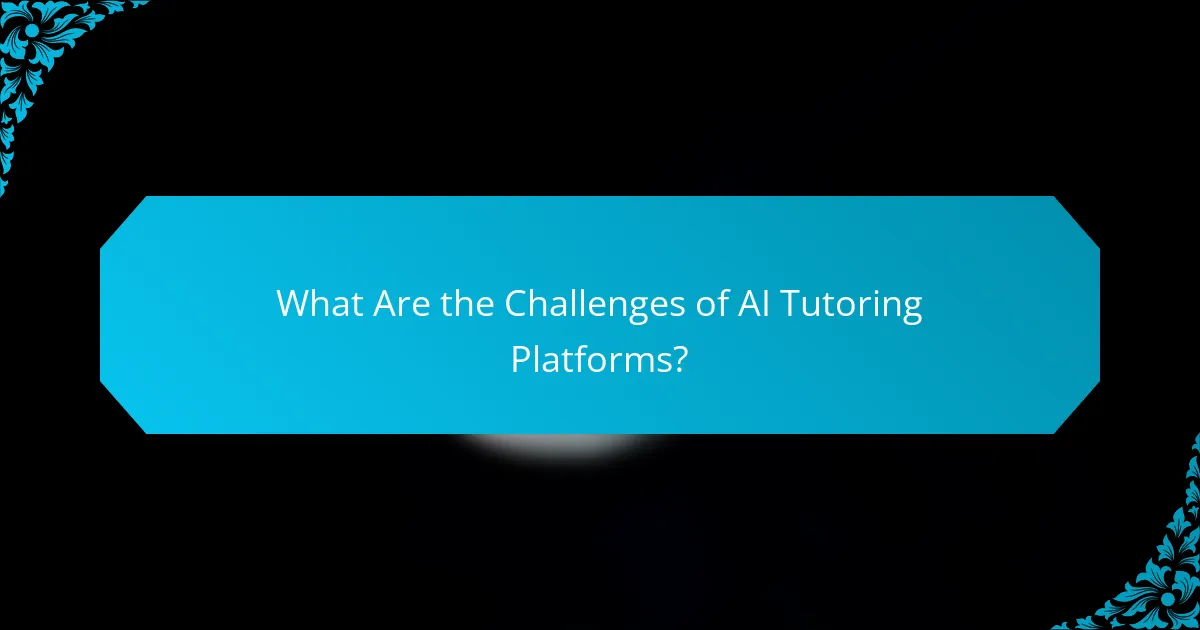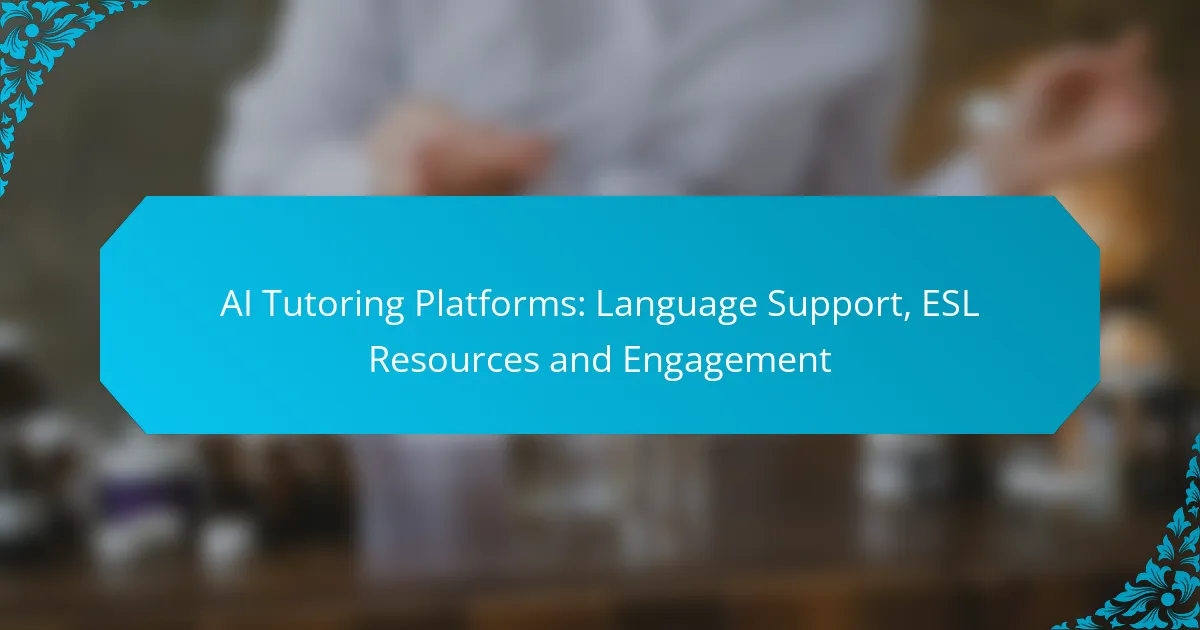AI tutoring platforms are revolutionizing language support by offering personalized and interactive learning experiences tailored to diverse language needs. Particularly beneficial for English as a Second Language (ESL) learners, these platforms utilize advanced technology to enhance engagement and provide immediate feedback, making the language acquisition process more effective and enjoyable.

What Are the Best AI Tutoring Platforms for Language Support?
The best AI tutoring platforms for language support offer interactive and personalized learning experiences tailored to various language needs. These platforms leverage advanced technology to enhance engagement and provide resources, particularly for English as a Second Language (ESL) learners.
Duolingo
Duolingo is a popular language learning app that uses gamification to teach languages. It offers bite-sized lessons that cover vocabulary, grammar, and pronunciation, making it accessible for beginners and intermediate learners alike.
The platform supports numerous languages and is particularly effective for ESL learners. Its interactive exercises and immediate feedback help users stay engaged and motivated.
Rosetta Stone
Rosetta Stone is known for its immersive approach to language learning, focusing on context and real-life scenarios. It emphasizes speaking and listening skills through its speech recognition technology, which helps users improve their pronunciation.
This platform is ideal for learners who prefer a structured curriculum. However, it may require a higher commitment in terms of time and financial investment compared to other options.
Babbel
Babbel offers language courses designed by linguistic experts, focusing on practical conversation skills. Its lessons are tailored to real-life situations, making it suitable for learners who want to use the language in everyday contexts.
With a subscription model, Babbel provides a range of languages and levels. Users benefit from personalized review sessions that reinforce learning, but the platform may not be as engaging as gamified alternatives.
Busuu
Busuu combines language learning with social interaction, allowing users to practice with native speakers. Its community feature enables learners to receive feedback on their writing and speaking exercises, enhancing the learning experience.
This platform is particularly beneficial for ESL learners looking for conversational practice. However, the free version has limited access, and users may need a subscription for full features.
Lingoda
Lingoda offers live online classes with qualified teachers, providing a more traditional classroom experience in a virtual setting. This platform is excellent for learners who prefer direct interaction and personalized instruction.
With a focus on speaking and listening skills, Lingoda caters to various proficiency levels. The flexibility of scheduling classes makes it convenient for busy learners, but it may be more expensive than self-paced options.

How Do AI Tutoring Platforms Enhance ESL Learning?
AI tutoring platforms significantly enhance ESL learning by providing tailored educational experiences that adapt to individual student needs. These platforms utilize advanced algorithms to personalize content, offer immediate feedback, and engage learners through interactive exercises, making language acquisition more effective and enjoyable.
Personalized Learning Paths
Personalized learning paths in AI tutoring platforms allow students to progress at their own pace, focusing on areas where they need the most improvement. By assessing a learner’s proficiency level, these platforms can curate lessons that target specific skills, such as vocabulary, grammar, or pronunciation.
For example, a beginner might receive foundational lessons on basic sentence structure, while an advanced learner could work on complex conversational skills. This tailored approach not only boosts confidence but also maximizes learning efficiency.
Real-time Feedback
Real-time feedback is a crucial feature of AI tutoring platforms, enabling students to receive immediate corrections and suggestions as they practice. This instant response helps learners understand their mistakes and reinforces correct usage, which is essential for mastering a new language.
For instance, when a student makes a grammatical error in a writing exercise, the platform can highlight the mistake and provide an explanation. This immediate interaction fosters a more engaging learning environment and encourages continuous improvement.
Interactive Exercises
Interactive exercises are designed to keep ESL learners engaged and motivated. These activities often include games, quizzes, and simulations that make language practice enjoyable while reinforcing key concepts. The interactive nature of these exercises helps maintain student interest and encourages regular practice.
Platforms may offer a variety of formats, such as role-playing scenarios for conversational practice or fill-in-the-blank exercises for vocabulary building. By incorporating different types of interactions, learners can develop their skills in a dynamic and effective manner.

What Features Should You Look for in AI Tutoring Platforms?
When selecting AI tutoring platforms, prioritize features that enhance language support, engagement, and progress tracking. These elements are crucial for effective learning, especially for ESL students, as they ensure a tailored and interactive educational experience.
Language Variety
AI tutoring platforms should offer a wide range of language options to cater to diverse learners. Look for platforms that support not only major languages like English, Spanish, and Mandarin but also regional dialects and less commonly taught languages. This variety allows students to learn in their preferred language, enhancing comprehension and retention.
Additionally, consider platforms that provide language-specific resources, such as vocabulary lists, grammar exercises, and cultural context. This can significantly enrich the learning experience and make it more relevant to the student’s background.
Engagement Tools
Engagement tools are essential for maintaining student interest and motivation. Effective platforms often include interactive features such as quizzes, gamified learning experiences, and real-time feedback mechanisms. These tools can transform traditional learning into an engaging activity, making it easier for students to stay focused.
Look for platforms that offer personalized learning paths based on student performance. This adaptability can help keep learners challenged yet not overwhelmed, ensuring a more productive educational journey.
Progress Tracking
Progress tracking is vital for both students and educators to assess learning outcomes. Choose AI tutoring platforms that provide detailed analytics on student performance, including strengths, weaknesses, and areas needing improvement. This data can help tailor future lessons and interventions effectively.
Some platforms may offer visual progress reports or dashboards that highlight achievements over time. Regularly reviewing these insights can motivate students and help them set realistic learning goals, ultimately fostering a sense of accomplishment.

How Do AI Tutoring Platforms Compare in Pricing?
AI tutoring platforms vary significantly in pricing, with options ranging from free to subscription-based models. Understanding these costs can help you choose a service that fits your budget and learning needs.
Duolingo Free vs. Premium
Duolingo offers a free version that provides access to a wide range of language courses, making it an attractive option for learners on a budget. The premium version, Duolingo Plus, typically costs around $6 to $12 per month, depending on the subscription length, and includes features like an ad-free experience and offline access.
When deciding between free and premium, consider how often you plan to use the platform and whether the additional features are worth the cost for your learning style. Many users find the free version sufficient for casual learning.
Rosetta Stone Subscription Costs
Rosetta Stone operates on a subscription model, with prices generally ranging from $11 to $15 per month when billed annually. They also offer a lifetime subscription option, which can be a one-time payment of around $200 to $300, depending on promotions.
This platform is known for its immersive approach, which may justify the higher price for serious learners. Keep an eye out for seasonal discounts or promotional offers that can reduce costs significantly.
Babbel Pricing Plans
Babbel’s pricing plans are structured around subscription lengths, with costs typically between $6 to $13 per month based on whether you choose a one-month, three-month, or yearly plan. The longer the commitment, the lower the monthly rate.
Babbel focuses on conversational skills and practical vocabulary, making it a solid choice for learners looking to use a language in real-life situations. Evaluate your commitment level and learning goals to select the most cost-effective plan.

What Are the Benefits of Using AI for ESL Resources?
AI offers significant advantages for ESL resources by enhancing personalized learning experiences, improving engagement, and providing instant feedback. These benefits help learners grasp language concepts more effectively and at their own pace.
Accessibility
AI-driven ESL resources are accessible to a wide range of learners, regardless of their location or time zone. Online platforms allow students to engage with materials anytime, making it easier for those with busy schedules or limited access to traditional classrooms.
Additionally, many AI tools support multiple languages, enabling non-native speakers to navigate learning environments comfortably. This feature is particularly beneficial for learners in diverse linguistic backgrounds, as it fosters inclusivity and reduces language barriers.
Scalability
AI technologies can efficiently scale to accommodate large numbers of users without compromising the quality of education. This scalability allows institutions to offer personalized learning experiences to thousands of students simultaneously.
For example, an AI tutoring platform can adapt its curriculum based on individual progress, ensuring that each learner receives tailored support. This adaptability is crucial in meeting the varying needs of ESL students, from beginners to advanced learners.
Cost-effectiveness
Utilizing AI for ESL resources can significantly reduce costs associated with traditional language instruction. Many platforms offer subscription models that are more affordable than hiring personal tutors or attending in-person classes.
Moreover, AI can automate administrative tasks, such as grading and progress tracking, which further lowers operational costs for educational institutions. This efficiency allows for reinvestment in other areas, enhancing the overall learning experience for students.

What Are the Challenges of AI Tutoring Platforms?
AI tutoring platforms face several challenges that can impact their effectiveness, including limited personal interaction, language support issues, and varying levels of engagement. These factors can hinder the learning experience for users, particularly in language acquisition and ESL contexts.
Limited Personal Interaction
One major challenge of AI tutoring platforms is the limited personal interaction they provide. Unlike traditional tutoring, where students can engage in real-time conversations and receive immediate feedback, AI systems often rely on pre-programmed responses, which can feel impersonal and less engaging.
This lack of personal connection can lead to decreased motivation and engagement, especially for learners who thrive on social interaction. To mitigate this, platforms can incorporate features like video calls or live chat options to enhance the human element in the learning process.
Additionally, it’s essential for users to choose platforms that offer personalized learning paths and adaptive feedback, which can help create a more tailored experience despite the inherent limitations of AI.
